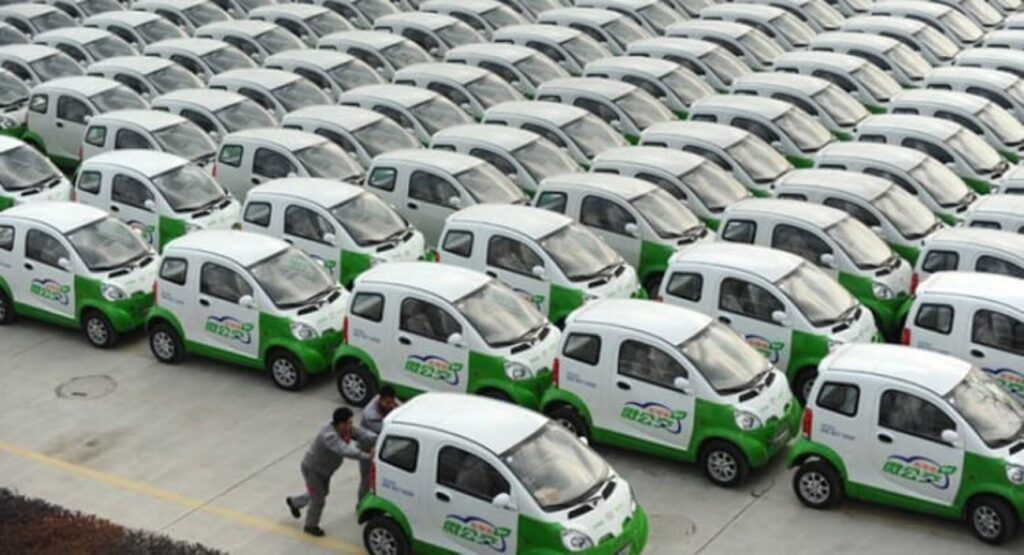Broadcaster Sonari Glinton and podcaster Mike Pesca discuss GM’s recent proclamation to go electric by 2035. (Full podcast here.)
Pesca: A couple of months ago, the state of California announced no new gas vehicles, they were going electric and they put a time stamp on it of 2035. The UK then ups the ante and announces no diesel or gasoline or as they say, petrol, cars and vans will be sold in that country starting in 2030. And then GM and their CEO, Mary Barra, announce, OK, GM sees that and we too will no longer make gas and diesel powered vehicles by 2035. I guess they figured if California won’t be buying them, what’s the use of making them?
 Glinton: … what’s happening now for some people is that America is not in the driver’s seat. When it comes to electrification, it is not even in the driver’s seat when it comes to the auto industry anymore. What our vehicles, our regulatory regime, even the styling is increasingly led by what China wants. That is where the industry is making the money. That is where the future is: Brazil, Russia, India and China. And I would throw in Africa for the long game.
Glinton: … what’s happening now for some people is that America is not in the driver’s seat. When it comes to electrification, it is not even in the driver’s seat when it comes to the auto industry anymore. What our vehicles, our regulatory regime, even the styling is increasingly led by what China wants. That is where the industry is making the money. That is where the future is: Brazil, Russia, India and China. And I would throw in Africa for the long game.
Pesca: is it plausible that China can go gasoline free with their cars within the same kind of time frame we’re talking about with these Western countries and companies?
Glinton: It is definitely hard, but I think one of the things that people forget about China is that the Chinese government is really nervous. They do a lot, a lot of polling. And one of the number one issues is the air quality in China. What the Communist Party sees as a danger is the environment, politically speaking.
In England, electrification is not a left-right issue the way it is pretty much solely here in the US. The problem of the automobile, whether it’s car deaths or pollution, is really genuinely important around around the globe.
Pesca: in China, is the automobile sector as responsible for as great a percentage of their global greenhouse gas emissions as other sectors? How does that compare to the United States?
Glinton: What’s really super interesting is China followed the regulatory regime of the state of California regulators. In order to make a dent in CO2, you have to tackle the automobile. And there was a really bold plan here in California that essentially the Chinese adopt … And you had a moment where because of the bailout of the auto industry, the Obama administration had essentially brought the auto industry to heal …
The fact is that the money people are shifting their profiles towards electrification. … The industry gets it. The environmentalists get it. And almost all the governments around the globe get that this is a thing to do. The one important place that people haven’t gotten it is the American consumer. Electrification has not penetrated barely beyond three percent in America. … The technology of electric cars is over 100 years old. What we don’t have is the infrastructure yet and the comfort with electrification. …
We went through a communication revolution in the last twenty years. Imagine a transportation revolution – and we’re seeing it happen. Imagine the car going from a dial phone to the iPhone. That is what’s in the near future for the auto industry. And that means literally trillions of dollars. …













Yes we will see far FAR more EVs but at a far FAR slower pace due to range anxiety, cost of electricity AND PRICE.
Doesn’t China (or US or Germany or UK) have loads of coal plants for electricity ? Will they all turn them off the next decade, say by 2035? Hardly.
See the latest debacle in TX. Add 15-20M electric vehicles to that multi-day power failure debacle and it just won’t work. It will be several decades for a full transition to all EVs !
“all electric” for new cars by 2030 or even 2035 is not achievable. Maybe if you include plug-in hybrids. EVs work well for urban areas. Once you add less urban areas and cold weather the concept is not yet proven.
Where’s the nuclear debate here in this context ? To get reliable low to no CO2 electricity production at scale, day or night, summer or winter, sun or no sun, wind or no wind, more nuclear (or more hydro) is the only solution that makes sense at scale. More here in this book by the environmentalist Michael Shellenberger https://www.amazon.com/Apocalypse-Never-Environmental-Alarmism-Hurts/dp/0063001691